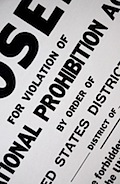Blog
Subscribe
Join over 5,000 people who receive the Anecdotally newsletter—and receive our free ebook Character Trumps Credentials.
Categories
- Anecdotes
- Business storytelling
- Collaboration
- Communication
- Corporate Storytelling
- Culture
- Decision-making
- Employee Engagement
- Events
- Fun
- Insight
- Leadership Posts
- News
- Podcast
- Selling
- Strategy
Archives
- March 2024
- December 2023
- November 2023
- October 2023
- September 2023
- August 2023
- July 2023
- June 2023
- May 2023
- April 2023
Years
Banning Facebook and the like from corporations
 On January 16, 1920 the National Prohibition Act came into effect in the United States and all intoxicating liquor was banned, and so began the black market in alcohol. Even before the ban was set in place I’m sure racketeers had plans to take drinking underground and at the same time any chance of the authorities having influence of black market alcohol consumption evaporated.
On January 16, 1920 the National Prohibition Act came into effect in the United States and all intoxicating liquor was banned, and so began the black market in alcohol. Even before the ban was set in place I’m sure racketeers had plans to take drinking underground and at the same time any chance of the authorities having influence of black market alcohol consumption evaporated.
Like the 1920s US legislators, organisations that are still deciding whether to allow of not allow applications like Facebook are harbouring the misguided belief that they can control the use of these technologies. There is a good chance that for any large organisation that hasn’t already sanctioned the use of Facebook (or any of its social networking cousins) there are already a variety of Facebook groups about their company established, hosted and actively engaging their employees.
I had the pleasure of chatting with Kirsty Areki, who is the Global Collaboration Manager for Mars. Kirsty told me about a recent flight she had had and how the person sitting next to her managed a large call centre. The call centre manager felt he had to watch everyone like a hawke and things like Facebook would be just a terrible time waster. Kirsty suggested that for a mundane and stressful job like working in a call centre access to something like Facebook to keep in contact with family and friends would be a tremendous benefit. The most important step, Kirsty said, was to engage the call centre workers in deciding the rules of how Facebook could be used. That way the staff police themselves and pull into line anyone who abuses the benefit. No one would want to lose a perk like Facebook.
Mars support the use of Facebook, Twitter, blogs and wikis. Some are official groups set up by the company. Many are generated as the need has arisen by whoever has the need.
There is one slight worry about the overuse of social software which was brought to my attention by Susan Greenfield this morning (podcast listening), which is encapsulated in the aphorism, “use it or lose it.” We get good at what we practice (according to some it takes 10,000 hours of reflective practice to become expert in something) and the more time we spend online the less time we have to practice face-to-face dialogue, reading the emotions, dealing with difficult conversations, dealing with second by second uncertainty without time to craft a considered response. My feeling is that we are a long way off for this to be a problem and for me my online life only creates more opportunities for interesting face to face encounters. But I wonder about our children and how much time they are spending in front of computer and video screens.
About Shawn Callahan
Shawn, author of Putting Stories to Work, is one of the world's leading business storytelling consultants. He helps executive teams find and tell the story of their strategy. When he is not working on strategy communication, Shawn is helping leaders find and tell business stories to engage, to influence and to inspire. Shawn works with Global 1000 companies including Shell, IBM, SAP, Bayer, Microsoft & Danone. Connect with Shawn on: